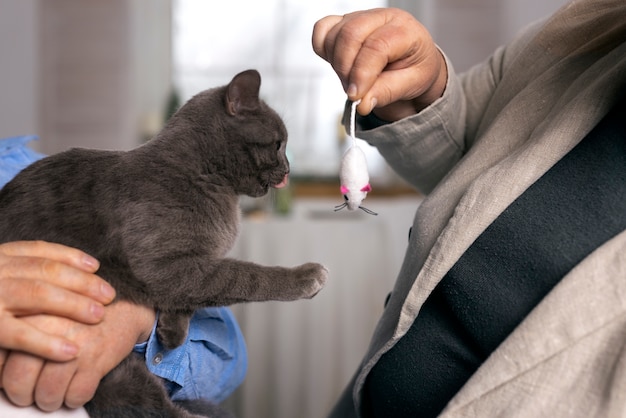When Sudden Limping in Pets Needs Urgent Care

When Sudden Limping in Pets Needs Urgent Care
If you have ever noticed your dog or cat suddenly limping or refusing to put weight on a leg, you know how alarming it can feel. Maybe your usually energetic pup is now reluctant to rise, or your cat is favoring one paw and hiding under the bed. Sudden limping in pets is always a cause for concern, but how can you tell when the situation calls for immediate veterinary attention versus a watch-and-wait approach at home?
At VetCheck Pet Urgent Care Center - Lutz, we understand how distressing it is to see your furry companion in pain or discomfort. Our veterinary team is dedicated to providing fast, compassionate care for non-life-threatening emergencies like unexpected lameness. Located at 1809 Collier Parkway, Lutz, FL 33549, we offer urgent veterinary diagnostics and treatment, so you do not have to wait for an appointment or worry about finding help when your regular vet is closed. Walk-ins are always welcome, because emergencies are never planned.
In this guide, we will explain how to recognize serious limping in dogs and cats, common causes of sudden lameness, what types of injuries or conditions demand urgent veterinary care, and how our emergency and urgent care services in Lutz can quickly diagnose and treat your pet. We will also cover steps you can take at home and when to seek immediate help from an emergency vet near you.
Recognizing Sudden Limping in Pets: What to Look For
Sudden limping in pets can range from a mild, intermittent limp to a complete refusal to bear weight on a limb. As a pet owner, it is important to watch closely for certain symptoms that indicate your pet may need urgent veterinary care. Key signs of limping that warrant concern include a pet who suddenly cannot use one or more legs, limping that is severe or causes your pet to vocalize in pain, swelling or a noticeable deformity in the limb, or bleeding, bruising, or visible wounds. Other warning signs are your pet dragging a limb, yelping or crying when the limb is touched, or showing any signs of trauma such as being hit by a car or falling from a height.
Sometimes, limping is accompanied by additional signs such as lethargy, loss of appetite, or reluctance to move. If your pet is also shaking, panting excessively, or hiding, these behaviors can signal distress or pain. In the hot and humid climate of Lutz and surrounding communities, outdoor pets might also suffer from injuries related to rough ground, hot pavement, or encounters with wildlife. If you notice any of these symptoms, it is safest to seek urgent care rather than wait.
Common Causes of Sudden Limping in Dogs and Cats
Limping can develop for many reasons, from minor sprains to more serious injuries or underlying conditions. In dogs, sudden limping often results from playing too hard, slipping on a slick surface, or injuring a nail during a walk. Cats, meanwhile, may leap from high places or get a paw caught, leading to acute lameness. Other causes of sudden limping in pets include soft tissue injuries such as sprains or strains, broken bones or fractures, torn ligaments or dislocated joints, and wounds or lacerations that may not be immediately visible under fur.
Additionally, certain conditions such as insect or snake bites, embedded foreign objects like thorns or glass, or even infections can trigger limping. In dogs, torn toenails are a frequent culprit, especially after energetic play or running outdoors. Cats may develop abscesses from bite wounds that become swollen and painful. Sometimes, the cause is less obvious, such as a joint infection or an underlying orthopedic disease that suddenly worsens.
When your pet is limping, it is important to consider what might have happened recently—a tumble down the stairs, a romp in the yard, or exposure to potential hazards. In some cases, limping may be the first sign of a more serious medical issue, such as a blood clot or neurological problem. Because the range of causes is so broad, an accurate diagnosis is crucial, which is why our in-house diagnostic services in Lutz are designed to quickly identify the source of your pet’s discomfort.
Urgent Veterinary Care for Sudden Limping: What to Expect
When your pet arrives at VetCheck Pet Urgent Care Center - Lutz for sudden limping, our veterinary professionals begin with a thorough physical examination to assess pain, swelling, and range of motion. Depending on the findings, advanced diagnostics such as veterinary digital x-rays in Lutz may be recommended to visualize bones, joints, and soft tissues. These tools help us determine if your pet has suffered a fracture, dislocation, or ligament injury that requires immediate intervention.
Treatment approaches depend on the underlying cause. For minor soft tissue injuries, pain management, anti-inflammatory medications, and rest may be sufficient. If a broken bone or joint dislocation is diagnosed, splinting, bandaging, or surgical correction might be necessary. In cases where there is a torn nail, our veterinary team can gently trim and treat the area, reducing pain and preventing infection. Wounds or lacerations are carefully cleaned, sutured if needed, and treated to minimize complications.
Sometimes, pets present with more complex injuries, such as foreign bodies embedded in the paw or deep abscesses. Our urgent care team is equipped to handle these situations promptly, reducing the risk of further injury or infection. If your pet is experiencing severe discomfort, we can provide sedation or pain control to ensure a safe and low-stress examination. Throughout every step, our goal is to relieve your pet’s pain and restore mobility as quickly as possible.
Our walk-in policy means you do not have to wait for an appointment or worry about being turned away in your time of need. If your pet’s condition requires hospitalization or surgery, we offer full or partial day hospitalization and a range of urgent surgical procedures right here in our Lutz facility.
At-Home Steps and Prevention for Limping Pets
While urgent veterinary care is essential for severe or unexplained limping, there are a few practical steps you can take at home to support your pet’s recovery or prevent injuries in the first place. If your pet seems only mildly affected and is still using the limb, confine them to a safe, quiet area to limit movement and prevent further injury. Provide soft bedding and encourage rest. Avoid giving any human medications, as these can be toxic to pets.
Inspect your pet’s paw pads and nails for signs of cuts, swelling, or embedded objects. If you find a superficial wound, gently clean it with saline solution and monitor for swelling or discharge, but do not attempt to remove deeply embedded items or treat severe wounds on your own. Preventive steps include keeping nails trimmed, ensuring your yard and walking areas are free of sharp hazards, and supervising playtime, especially in unfamiliar or rugged environments.
In the warm climate of Lutz, take care to avoid hot pavement, which can burn paw pads, and watch for wildlife encounters. Early intervention for minor injuries can sometimes prevent more serious problems, but if limping persists for more than 24 hours, or is accompanied by other symptoms, urgent care is always the safest route.
When to Seek Immediate Veterinary Care for Limping
It can be difficult to know exactly when to rush to the urgent care vet near you. As a rule, immediate veterinary attention is needed if your pet is unable to stand or walk, refuses to use the affected limb, or is in visible pain. Other red flags include swelling or heat in the limb, any obvious deformity, bleeding that does not stop quickly, or wounds with foreign objects present. Pets who have suffered trauma such as being hit by a car, falling from a height, or being bitten should always be evaluated right away.
Additionally, if your pet’s limping is accompanied by other concerning signs such as difficulty breathing, pale gums, collapse, or sudden severe lethargy, seek emergency veterinary care immediately. Even if the injury seems minor, rapid swelling, infection, or internal bleeding can develop. Our veterinary emergency and urgent care services in Lutz are designed to provide fast assessment and treatment, so you never have to second-guess whether your pet’s situation is urgent enough.
Remember, walk-ins are always welcome at VetCheck Pet Urgent Care Center - Lutz, and we are here for you during evenings, weekends, and whenever your regular vet is unavailable. Your pet’s safety and comfort are our top priorities, and prompt care is often the key to a successful recovery.
Take Action for Your Pet’s Health: Visit Us for Sudden Limping in Lutz
No one wants to see their beloved dog or cat in pain from sudden limping. Knowing when to act and where to turn can make all the difference in your pet’s comfort and long-term health. At VetCheck Pet Urgent Care Center - Lutz, our veterinary team is ready to provide expert urgent veterinary care for sudden limping, injuries, or any unexpected health concerns. Whether your pet has suffered a toenail injury, a sprain, or something more serious, we offer comprehensive diagnostics and treatment options right here in Lutz.
Walk-ins are always welcome, and you never need an appointment. If you need an urgent care vet near me, or are looking for fast pet diagnostics in Lutz, our compassionate team is here to help. For immediate assistance or directions, call (813) 501-5811 or visit us at 1809 Collier Parkway, Lutz, FL 33549.
Your pet’s wellbeing is our highest priority, and we are proud to serve families in Lutz and surrounding communities with the urgent veterinary care they deserve. If you are ever in doubt about your pet’s limping or injury, do not wait—visit your local emergency vet near you for peace of mind and prompt relief.
This information is intended for educational purposes only and should not replace professional veterinary advice. If your pet is limping or showing signs of pain, always seek immediate evaluation from a qualified veterinarian.



















